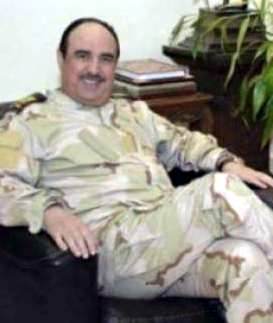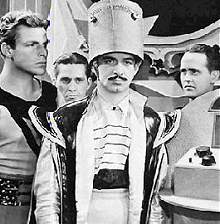November 4, 2005: On October 31st a unanimous resolution of the U.N. Security Council demanded, in unusually strong terms, that Syria cooperate fully with the U.N. investigation into the February 14th bomb attack that killed former Lebanese Prime Minister Rafik Hariri and 20 others or face âfurther action.â Although the resolution came as no surprise, the Baathist government of Bashr Asad apparently believed that the âsuicideâ on October 12th of interior minister Maj. Gen. Ghazi Kanaan in his Damascus office would lead to the matter being dropped. As a result, Asad is seeking a way to deal with the resolution, since outright cooperation with the U.N. investigation will likely result in serious charges against high ranking Syrian officials.
Among the measures being taken by the regime to counter international pressure is to organize âspontaneousâ student rallies outside of Western embassies. The process is relatively simple, a squad of secret police turn up at a high school or university, announce everyoneâs going to a rally, and then herd students and faculty to the appropriate site.
In addition, Asad has once again publicly declared that no terrorists organizations will be tolerated in Syria, despite the fact that his government has been proclaiming just that â and tolerating them anyway â for some time now. While these measures may sell well in the state-controlled media, Syria has few friends abroad, and such measures are unlikely to deter further international pressure.
Meanwhile, Asad has quietly ordered the Syrian Army ( 200,000 active duty) to take preliminary steps to mobilize the reserves ( 280,000). This step is also primarily for domestic consumption, to forestall popular unrest and perhaps a coup, rather than to impress the U.N., which is unlikely to adopt a military response in the event of Syrian failure to cooperate.
Some analysts suggest that, after a little wiggling, Asad will in fact cooperate with the U.N. resolution. In this regard, itâs worth noting that a November 2nd editorial in The Syria Times, the official government newspaper, said Syria "wants to reach facts with tangible evidence and not suspicions and presumptions," and continued with "Through constructive cooperation with the international community, Syria is part of the solution to the pressing problem, not a part of the problem." Their reasoning is that Asad had no link to the assassination of Hariri and the probable murder of Kanaan, which were actually initiated by hard-liners in the government, men who were close supporters of the elder Asad during his 30-years in power. While no liberal, the younger Asad is known to be trying to ease some of his fatherâs staunchest supporters out of power. Cooperating with the U.N. resolution would be a good way to do this, since it offers him a way to preserve the Baathist regime â and his own authority â while getting rid of the dead wood.
Arab leaders have been quietly pressuring Pres. Bashir Asad to accede to the UN Security Council resolution requiring Syrian cooperation in the investigation of the assassination of former Lebanese Prime Minister Rafic Hariri. The most recent is Hosni Mubarak of Egypt. Meeting with Asad, Mubarak flatly informed him that Syria not only must cooperate in the investigation, but must also take steps to secure the Syrian-Iraq border against terrorist infiltrators and to get with the âMiddle East peace process,â a euphemism for supporting the Palestinian-Israeli peace process.
Asad, who apparently is treading a thin line between âreformersâ and âreactionariesâ in his country, has already taken a number of potentially useful steps.
Over the past few days Asad has --
· Appointed a special judicial committee to investigate the assassination
· Imposed closer scrutiny on men of military age entering Syria
· Ordered tighter security on the Iraqi frontier
· Told pro-Palestinian extremist groups â who are not supposed to be in Syria in the first place â to leave the country.
While these measures more or less conform with the demands of the international community, Asad has also been trying to satisfy his domestic extremists. There have been noisy public demonstrations outside western embassies. Nevertheless, in advance of these âspontaneousâ demonstrations, the Syrian police have beefed up security at the embassies involved, with more than adequate numbers to insure that things donât get out-of-hand.
Aside from his problems with the arch-conservative Baathists in the government, Asad also has some problems in his family. A possible key figure in the assassination of Hariri is Asef Shawkat, who is not only Syriaâs Chief of Military Intelligence, but also Asadâs brother-in-law (amazingly, Shawkat attained the marital tie by eloping with Asadâs sister Bushra, back when her father was dictator of Syria, and lived to tell the tale), who is a close ally of Asad, and apparently one of the âreformers.â |
 [al-Monitor] It seems that a curse has befallen the Syrian intelligence officers who took up posts under the Syrian tutelage in Leb from 1990 to 2005. Ten years following the withdrawal of the Syrian army from Leb on April 26, 2005, a series of tragic events has befallen these security officials. One by one, their names have been struck off the "Leb's Syrians" list. Most recently, Rustom Ghazaleh was pronounced dead in Damascus on April 24. His death came weeks after news of a mysterious accident in February, involving his beating and torture at the hands of a Damascus intelligence branch.
[al-Monitor] It seems that a curse has befallen the Syrian intelligence officers who took up posts under the Syrian tutelage in Leb from 1990 to 2005. Ten years following the withdrawal of the Syrian army from Leb on April 26, 2005, a series of tragic events has befallen these security officials. One by one, their names have been struck off the "Leb's Syrians" list. Most recently, Rustom Ghazaleh was pronounced dead in Damascus on April 24. His death came weeks after news of a mysterious accident in February, involving his beating and torture at the hands of a Damascus intelligence branch.
 (AKI) - Ali Kanaan, the brother of Syria's former powerful interior minister
(AKI) - Ali Kanaan, the brother of Syria's former powerful interior minister  Faruq al-Shara, Syria's long-serving foreign minister, has been named as vice president, state news agency Sana reported, replacing Abdul Halim Khaddam, branded a traitor by Damascus. Bashar al-Assad, the Syrian president, replaced Shara with Walid Muallem, currently deputy foreign minister, in a cabinet shake-up that left the key posts of prime minister and defence minister unchanged. Bassam Abdelmajid was named interior minister. He replaces
Faruq al-Shara, Syria's long-serving foreign minister, has been named as vice president, state news agency Sana reported, replacing Abdul Halim Khaddam, branded a traitor by Damascus. Bashar al-Assad, the Syrian president, replaced Shara with Walid Muallem, currently deputy foreign minister, in a cabinet shake-up that left the key posts of prime minister and defence minister unchanged. Bassam Abdelmajid was named interior minister. He replaces 
 Embattled Syrian President Bashar Assad was dealt more bad news Friday night after former Syrian Vice President
Embattled Syrian President Bashar Assad was dealt more bad news Friday night after former Syrian Vice President  Damascus, 21 Oct. (AKI) - The Syrian authorities are reported to have rejected a request by the family of the late interior minsiter
Damascus, 21 Oct. (AKI) - The Syrian authorities are reported to have rejected a request by the family of the late interior minsiter